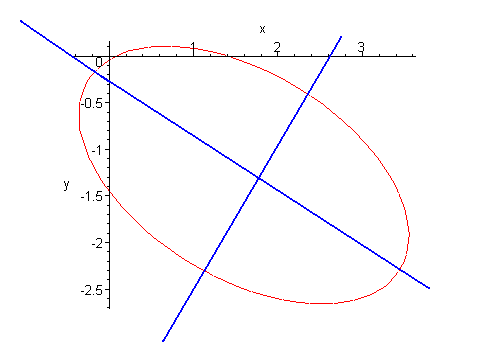Conic Sections
The Problem
We all know how to sketch the graph of an ellipse or hyperbola given an equation such as
x2 + 2y2 + 4x + 12y + 6 = 0
by completing the square, finding the center of the ellipse, plotting the vertices and sketching the graph. If you forgot this process click here. The goal of this discussion is to be able to sketch a conic section given by
ax2 + 2bxy + cy2 + dx + ey + f = 0
The fact that there is an xy term here poses the challenge. We will look at the example
![]()
Our goal is to graph this conic. At this point, we do not even know if it is a hyperbola, ellipse, or circle. The type will come out soon enough.
The Solution
The key to solving this is to realize this as a matrix equation:
xTAx + Bx + f = 0
Where A is a 2 x 2 matrix, B is a 1 x 2 matrix and xT = (x,y). For our example we have

Next we diagonalize the matrix A. Since the matrix is symmetric, it can be orthogonally diagonalized. The eigenvalues are 7 and 2. We can check that the diagonalization is given by
A = PDPT
or

We can write
xTAx = xTPDPTx = (PTx)TD(PTx)
and let
y = PTx or x = Py
That is

and

So that

We can put this all together to get
7x'2 + 2y'2 + 6x' +8y' - 2/7 = 0
Completing the square gives
7(x' + 3/7)2 + 2(y' + 2)2 = 9
This is the ellipse centered at (-3/7, -2) in the (x', y') coordinate system. with
a
= 3 /![]() b = 3 /
b = 3 /![]()
The effect of the change of coordinates is a rotation of the graph by an angle of
arctan(-2) = -1.1
The value of -2 was obtained by finding P21/P11. The graph is shown below.

Eigenvalues and Types of Conics
In algebra, we learn how to identify conics. If the signs are opposite then we get a hyperbola and if the signs are alike, but the coefficients are different, we get an ellipse. If the signs are the same, we get a circle. If there is an absence of a squared term, then we have a parabola. We have a similar classification system for our rotated conics.
Theorem
Let
xTAx + Bx + f = 0
be a conic and let
s = l1 l2
then
- If A is
the zero matrix, we have a line. Otherwise
- If s
< 0 the conic is a hyperbola
- If s
> 0 then we get an ellipse
(possibly degenerate) that is a circle if the eigenvalues are equal.
- If s = 0 then we get a parabola
Back to the Linear Algebra Home Page
Back to the Math Department Home Page
e-mail Questions and Suggestions